Israel-Hamas War: What happened on Day 118?
Qatar FM: Hamas gives initial approval for Gaza ceasefire, hostage deal • Israel defeats Hamas in Khan Yunis, over 10,000 Gazan terrorists killed
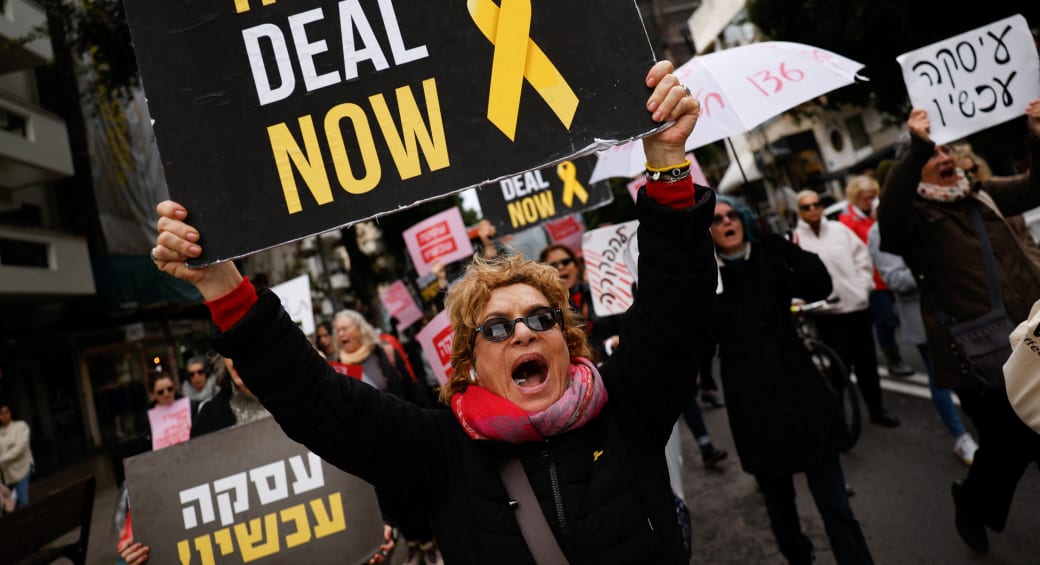
Israel's state comptroller to probe transfer of funds to Hamas
Israel's State Comptroller Matanyahu Englman requested government documents on the transfer of funds to Hamas as part of his office's investigation into the October 7 massacre, Israeli media reported Thursday.
This is a developing story.
Go to the full article >>Hamas 'unlikely' to reject Gaza hostage deal, will demand war's end
"I expect that Hamas will not reject the paper, but it might not give a decisive agreement either," said a Palestinian official speaking on condition of anonymity.
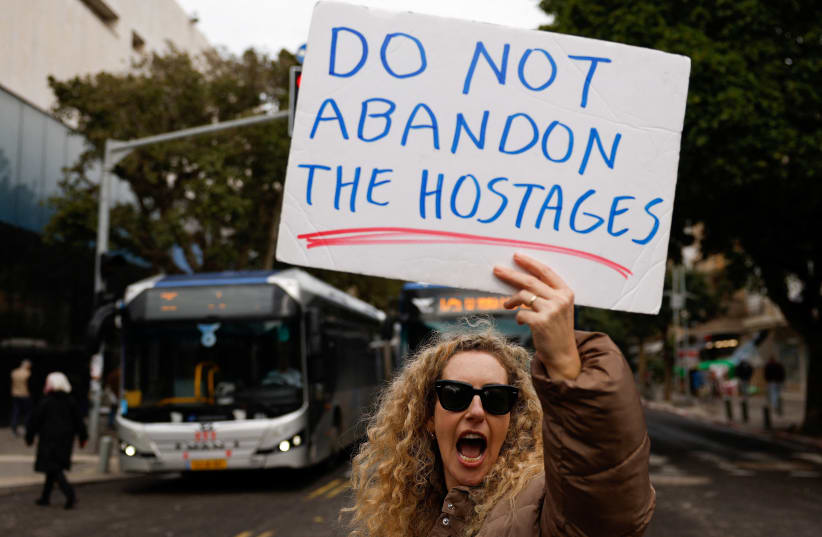
Hamas is unlikely to reject a Gaza ceasefire proposal it received from mediators this week but will not sign it without assurances that Israel has committed to ending the war, a Palestinian official close to the talks said on Thursday.
Qatari and Egyptian mediators presented Hamas this week with the first concrete proposal for an extended halt to fighting in Gaza, agreed with Israel and the United States at talks in Paris last week. Hamas has said it is studying the text and preparing a response.
The Palestinian official said the Paris text envisions a first phase lasting 40 days, during which fighting would cease while Hamas freed remaining civilians from among more than 100 hostages it is still holding. Further phases would see the release of Israeli soldiers and the handover of the bodies of dead hostages.
"I expect that Hamas will not reject the paper, but it might not give a decisive agreement either," said the Palestinian official speaking on condition of anonymity.
"Instead, I expect them to send a positive response and reaffirm their demands: for the agreement to be signed, it must ensure Israel will commit to ending the war in Gaza and pull out from the enclave completely."
The only pause in the fighting so far, at the end of November, lasted only a week.
Go to the full article >>No alternative to Palestinian Authority ruling Gaza - Labor MK
Kariv's argument in favor of involving the PA in Gaza is simple: Israel counts on and cooperates with the PA in the West Bank, so why not Gaza?

The Israeli Right and Center's plan to grant power in the Gaza Strip to local Gazan groups once Hamas is defeated is "unrealistic" and "negligent," and there is no alternative to eventually allowing the Palestinian Authority to administer the Strip, Labor MK Gilad Kariv said to The Jerusalem Post in an interview on Wednesday.
"The debate about the 'day after' (the war) is negligent, and is a debate that endangers the military achievements of the war," Kariv begins. "Moreover, it endangers our soldiers. When you do not have a diplomatic agenda, you tend to continue with military actions …and we may find ourselves in a situation where we continue to endanger our soldiers more than what is necessary if we had a diplomatic agenda."
"Third, it endangers the State of Israel's strategic assets. At the end of the day, the countries of the West, led by the United States, will not agree over time to the current strength of their strategic alliance, if Israel is not capable of presenting some form of diplomatic agenda," Kariv says.
Prime Minister Benjamin Netanyahu has the utmost responsibility in this matter, and his chronic indecisiveness on everything that does not have to do with his own political interests are not helpful, Kariv says. But the centrist parties' doctrine of "managing the (Israeli-Palestinian) conflict" as opposed to solving it, serves as de-facto support of Netanyahu's doctrine of weakening the Palestinian Authority –which is what led to the strengthening of Hamas, Kariv argues.
"In this regard, the Israeli Center is a partner in the negligence," he says. "Even today, the Israeli center – that which sits in the coalition (National Unity), and that which leads the opposition (Yesh Atid) – is not able to free itself from the lack of realism of its diplomatic language. I hear (National Unity) minister Chili Tropper, who I respect as a person and a politician, give an interview about the 'day after' without mentioning the name of (PA president) Abu Mazen, as if [Abu Mazen] is (Harry Potter villain) Voldemort, whose name cannot be uttered" Kariv says.
If it works in West Bank, then why not Gaza?
Kariv's argument in favor of involving the PA in Gaza is simple: Israel counts on and cooperates with the PA in the West Bank, despite the fact that half a million Jews there live in close proximity to Palestinians. Why then would Israel not be willing to cooperate with a PA in Gaza – where no Jews will live?
"There is something here that does not make sense. If Abu Mazen equals (Hamas leader) Sinwar … then how do we live with him in Judea and Samaria? Are there no security concerns there?!
"If, as Bibi (Netanyahu) says, Fatahstan equals Hamastan, then why do you accept Fatahstan in Ramallah? And if (Yesh Atid chairman MK) Yair Lapid and (National Unity chairman, minister-without portfolio MK) Benny Gantz believe that the PA is irrelevant to Gaza, then how is it relevant to what happens in Judea and Samaria?" Kariv asks.
"Secondly, are we in a fantasy land?! There are senior ministers in the cabinet who say that they do not want to rule two million Palestinians (in Gaza), so they will work with 'local officials' in Gaza. What local officials are you talking about? The criminal gangs, who smuggled in arms from Egypt?! The Islamist Palestinian factions that are not Hamas, but Islamic Jihad?! Who do you think resides there?!"
"There are two options [in Gaza] – either Hamas, or the PA," Kariv says. "Stand up and speak courageously. If you are (Finance Minister and Religious Zionist Party chairman Bezalel) Smotrich, say that you believe in (Israeli) military rule, and if you are not Smotrich, then speak the truth: Israel lives with Abu Mazen and the PA in Judea and Samaria, and this is what needs to happen in Gaza."
Kariv admits that "this is not simple or easy. [The PA] needs to be pressured to do reforms, and must be watched closely, as at any given moment it can turn against us – (but) there is no alternative to the PA," Kariv says.
According to Kariv, no one believes that a two-state solution will emerge in the near future. What needs to happen, therefore, are two things: an update to the Oslo Accords, and a return of the PA to Gaza.
"The Oslo Accords can no longer serve as the contractual and narrative foundation of the relations between the two groups. They were written for five years, and 30 years have passed. The reality on the ground is different – from the amount of water that the Palestinians need, to the cellular communications protocols. Israel should have said that it is interested in renewing the diplomatic negotiations with the Palestinian Authority," Kariv says.
A "dramatic update" to the existing agreements so that they reflect the reality of 2024 is therefore necessary, Kariv says. For example, the division between areas A, B, and C is no longer relevant. There are claims that the Palestinians are "trespassing" onto Area C, but this is because areas A and B no longer contain them, Kariv argues. "Is there no demographic growth in Al Bireh or Nablus? What did you think will happen?" Kariv asks. This "dramatic update" will not include any evacuation of settlements, but will include redefining some lands as Area B instead of Area C, in order to enable Palestinian civil control in those areas. This will create a diplomatic, economic, and security horizon for the Palestinians, and enable the PA's eventual return to Gaza, Kariv argues.
The incentives for the PA that such a package deal presents, which will lead to tangible improvements in Palestinians' quality of life, gives Israel and its allies the leverage to condition the deal on fundamental reforms in the PA: Changing school curriculums, uprooting corruption, especially in the Palestinian security forces, cancelling payments convicted terrorists, and more, Kariv continues.
"They say that Abu Mazen and the PA is corrupt and rotten. Tell me, are the other Arab governments that we cooperate with the jewels of democracy? Is there no corruption there? Is the PA dramatically different from other Arab countries that are part of our leading security strategies?" Kariv asks.
While he does not expect the Israeli right to agree with him, what amazes him is that the Israeli center does not have a clear diplomatic vision. It is therefore the Zionist left's role to present an alternative, Kariv concludes.
Go to the full article >>Suspected ramming attack on soldiers near Hebron

A suspected ramming attack took place on Thursday afternoon in Givat Ha'avot, near the city of Hebron, when a vehicle attempted to hit IDF soldiers stationed at a post.
One Palestinian man was arrested according to reports.
This is a developing story.
Fearing Israeli assassinations, Iran pulls IRGC commanders from Syria - sources
As hardliners in Tehran demand retaliation, Iran's decision to pull out senior officers is driven partly by its aversion to being sucked directly into a conflict bubbling across the Mideast.
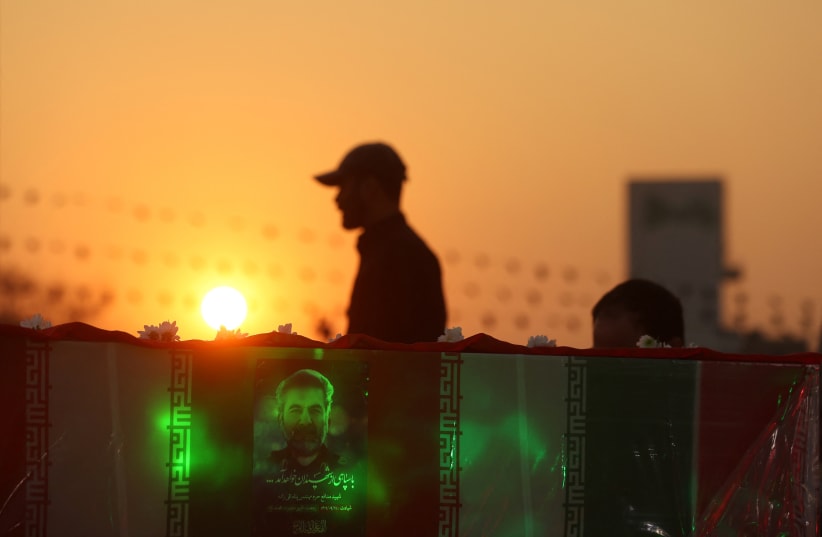
Iran's Revolutionary Guards have scaled back deployment of their senior officers in Syria due to a spate of deadly Israeli strikes and will rely more on allied Shi'ite militia to preserve their sway there, five sources familiar with the matter said.
The Guards have suffered one of their most bruising spells in Syria since arriving a decade ago to aid President Bashar al-Assad in the Syrian war. Since December, Israeli strikes have killed more than half a dozen of their members, among them one of the Guards' top intelligence generals.
As hardliners in Tehran demand retaliation, Iran's decision to pull out senior officers is driven partly by its aversion to being sucked directly into a conflict bubbling across the Middle East, three of the sources told Reuters.
Go to the full article >>Incident reported off Yemen's Hodeidah coast - UK
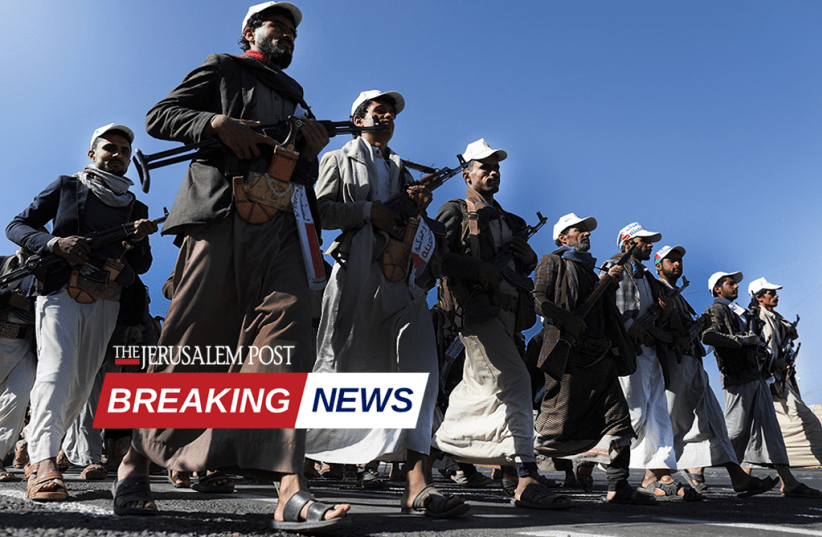
The United Kingdom Maritime Trade Operations (UKMTO) organization said that it received a report on Thursday of an incident 57 nautical miles west of Yemen's Hodeidah port.
Authorities are investigating, the UKMTO advisory note said.
Go to the full article >>Israel's Def. Min: Hezbollah fire has damaged 427 houses
Around 80,000 northern residents evacuated their homes in October under fire by Hezbollah once the war between Israel and Hamas in Gaza started.
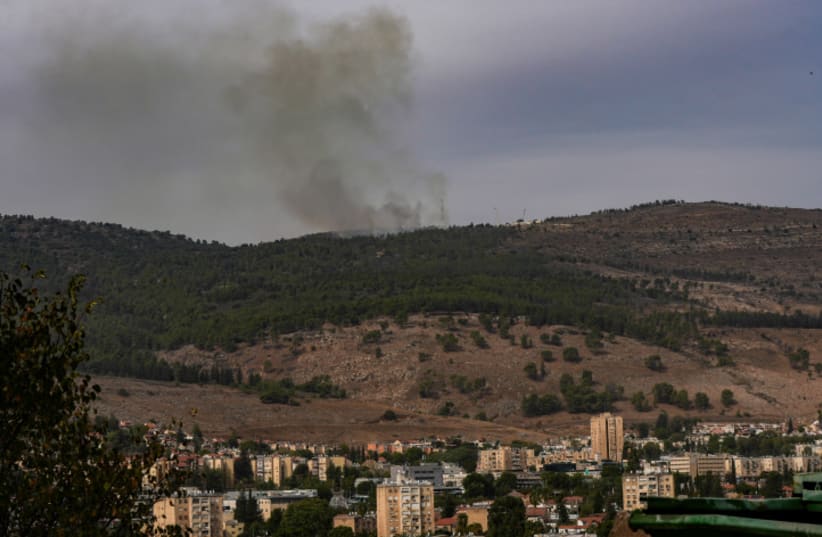
The Defense Ministry on Thursday announced that 427 houses of northern residents have had structural damage by Hezbollah rockets and anti-tank missiles since October.
80 of the houses have experienced direct hits and much greater damage.
Around 80,000 northern residents evacuated their homes in October under fire by Hezbollah once the war between Israel and Hamas in Gaza started.
Go to the full article >>Can the Iranian initiative in the Mideast be reversed? - analysis
The question is not whether the whole Iranian proxy octopus can be dismantled, but whether Israel, the US and others will seize the initiative.
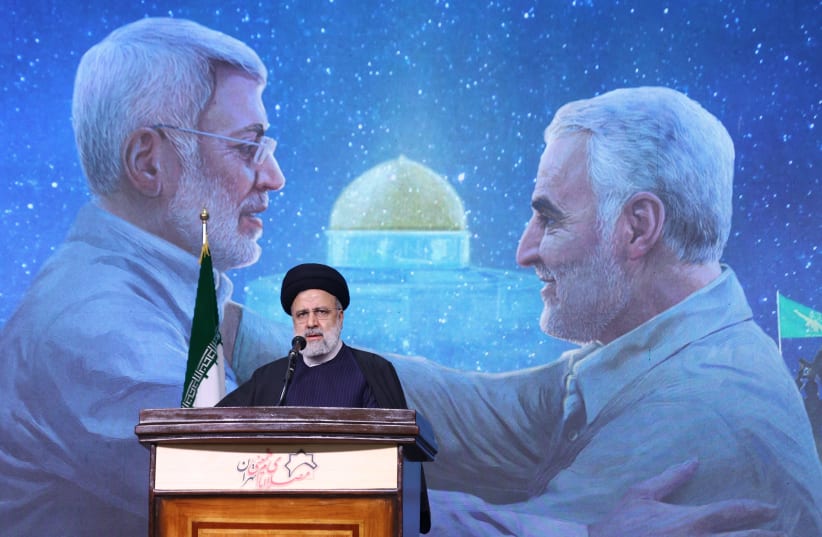
On January 27 Iranian-backed militias from Iraq launched a Shahed-style drone at a facility in Jordan where US soldiers are located. They killed three Americans. Overnight between January 31 and February 1 the Iranian-backed Houthis said they struck a merchant ship linked to the US in the Red Sea. Just before nine in the evening sirens also sounded in Shlomi in northern Israel, evidence of another Hezbollah attack. The attacks by Iranian-backed proxies in the region are daily and endless. Can the trend be reversed?
The attacks by Iran’s proxies in the region didn’t start on October 7. However, they have grown exponentially since the Hamas attack on Israel on October 7. Prior to October 7 the Iranian-backed militias in Iraq and Syria had carried around 90 attacks on US forces since January 2021. They had also carried out dozens of attacks on US forces between 2019 and 2021. Iran had also attacked Saudi Arabia’s Abqaiq facility and attacked ships off the coast of the UAE. As such, the Iranian threat was already clear and present. The drone threat to ships was also known. Iran had launched drones from Chabahar to target merchant ships off the coast of Oman.
Today the threat is even larger. For instance, on Tuesday evening the IDF said that “a number of launches from Syria toward the southern Golan Heights were identified. In response, IDF fighter jets struck military infrastructure belonging to the Syrian regime in the area of Daraa overnight.” This means that Iran is attacking on multiple fronts against both the US and Israel, and attacking commercial ships from all over the world.
Iran’s attacks have no provoked responses. The US has been striking back at the Houthis. The US has also vowed to respond to the attack in Jordan that killed three Americans. For instance, on January 31 US Central Command said they struck a Houthi UAVs and a ground control station in Yemen. Central Command has also begun to describe the drone attacks by the Houthis as “Iranian UAVs.” This points to the Iranian origin and connection to the types of drones being used. In the attack on Jordan for instance the drone was alleged to be a Shahed type, similar to those Iran exports to Russia for attacks on Ukraine. This drone has now become a kind of off-she-shelf export to Iran’s proxies and allies. It’s a kind of nascent version of what the AK-47 was for the Soviets and their proxies.
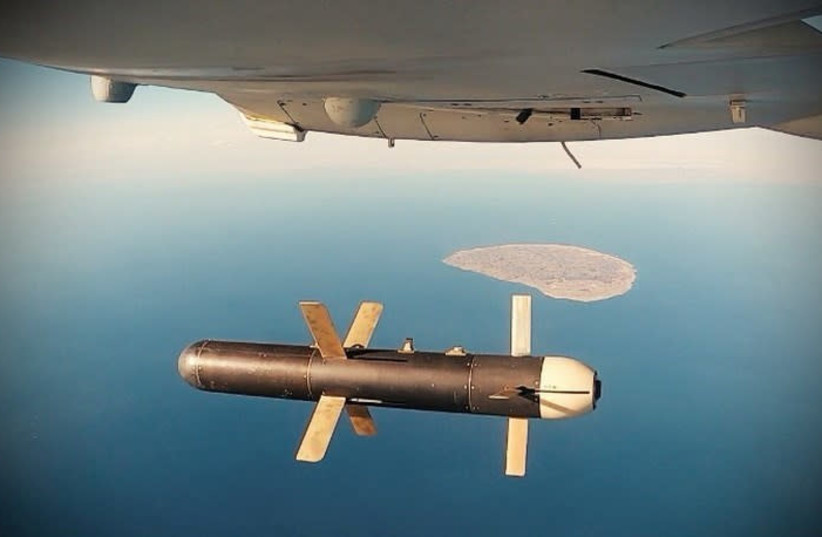
The challenge is how to seize the initiative from Iran
The challenge for the US, Israel and partner countries is how to seize the initiative from Iran. Iran is able to attack at places of its choosing over an arc of several thousand miles. The arc begins in the Mediterranean where Hezbollah has targeted energy facilities off Israel’s coast, and the arc goes into Lebanon and along the Israel-Lebanon border, then over the Golan into Syria around to Tanf where US forces are present, and down to Albukamal in the Middle Euphrates River Valley, there the arc includes US forces along the Euphrates river in places like Green Village and Conoco and Shadadi, which is up a tributary; and then the arc proceeds across Iraq to Erbil and Asad air base in western Iraq, before it goes down to the Persian Gulf and out past the straits of Hormuz around Yemen to the Bab el Mandeb straits and the Red Sea and to Eilat and then Gaza.
Iran can choose any place on this massive arc to attack. It has the long range capabilities now as it has showcased with the Shahed drones and Khaiber-Sheykan missile it recently used to target northwest Syria. As such Iran and its proxies can target anywhere that is within a 1,500-2,000km range of their forces. They decide when to attack. In most cases there may be a response. However, as in the case of Jordan, the response may take time. Iran then shifts its forces or its focus to another arena or frontline.
This is unlike most wars in history where there is a clear frontline or a clear adversary. Iran has created so many proxies and so many places to threaten that it can pop up and then disappear at will and because most people do not want a large regional war, there is no impetus to dismantle the whole threat. The question then is not whether the whole Iranian proxy octopus can be dismantled, but whether Israel, the US and others will seize the initiative. Iran is used to dictating the tempo since October 7.
Whether it directly planned October 7 and set the date or merely planned it with Hamas and let Hamas choose the date, is unclear. However, the fact Iran was able to key in Hezbollah attacks on October 8 and then expand the war to Yemen and cause almost 200 attacks in Iraq and Syria, along with 2,000 rockets fired by Hezbollah and dozens of drone and missile attacks by the Houthis, shows how rapidly Iran was able to take advantage of October 7 and manifest the threat regionally.
Go to the full article >>UN Special Envoy on Sexual Violence Patten hears hostages' testimony
Patten visited the Hostages and Missing Families Forum on Wednesday and met with Israeli hostages who returned from Hamas captivity along with families of soldiers still in Gaza.
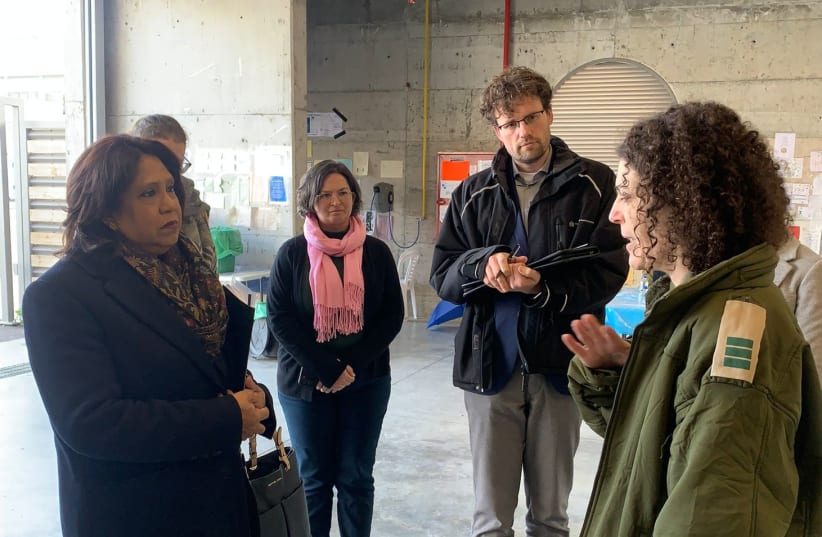
United Nations Special Representative on Sexual Violence in Conflict Pramila Patten continued her visit to Israel this week by hearing testimonies of survivors of Hamas captivity.
Patten visited the Hostages and Missing Families Forum on Wednesday and met with Israeli hostages who returned from Hamas captivity along with families of soldiers still in Gaza. Patten heard testimonies and the survivors' stories and pledged to use all available means at her disposal to bring about the release of the remaining captives held by Hamas.
From there, she proceeded to the military facility at Shura Camp, where she met with Captain (Res.) Avigail Bar Asher, head of the Military Rabbinate's Casualty Identification Team, who described the unit's difficult work in collecting all the evidence discovered by unit personnel since the October 7 massacres.
Patten's visit was initiated by the Department for International Organizations at the Foreign Ministry and Israel's Ambassador to the UN Gilad Erdan.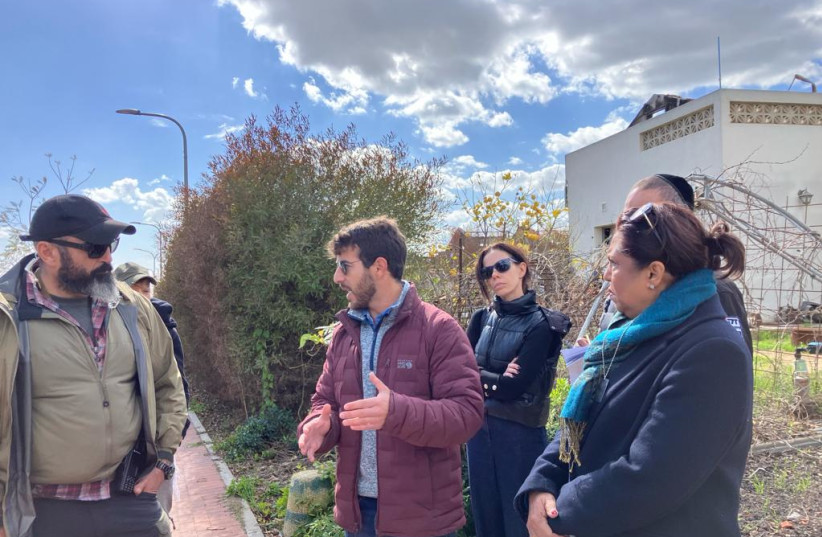
Patten also conducted a tour of Unit 105, part of Israel Police's Lahav 433. Thgere, she received a briefing from unit leaders on the national investigation against the Hamas terrorists who infiltrated Israel and the collection of evidence regarding the sexual assaults perpetrated by the terrorists.
Earlier this week, Patten began her visit by touring the Gaza border area, where she conversed with eyewitnesses in Kibbutz Be'eri, Kibbutz Nahal Oz and at Re'im, the site of the Nova music festival where hundreds were massacred.
At Kibbutz Be'eri, Patten met with local resident Or Yalin and IDF reservist Yossi Landa, listening to their testimonies about the atrocities that occurred.
'Your silence will be the license for these criminals'
Patten was invited to Israel to allow her to firsthand witness the extent of the atrocities and bring to the attention of the relevant international authorities the crimes of Hamas. The UN and major international women's organizations have come under constant criticism over their lingering to address the sexual crimes committed by Hamas.
On Monday, she urged the victims of sexual assault during the Hamas attacks to “break your silence” to help deliver justice, stating, "Break the silence because your silence will be the license for these criminals, and they will continue to commit these heinous crimes. There is no place in the battlefields of the 21st century for such crimes."
"After what happened on October 7, I couldn't just sit in my New York office and watch from the sidelines," Patten said. "Therefore, I have actively engaged through the Government of Israel in this mission, and I am very pleased to be here to express my solidarity with Israel, with the survivors, the families of the victims, and the families of the abducted."
UN Women, the organization's body for addressing gender equality, took until the first week of December to condemn Hamas's actions, nearly two months after the terrorist organization’s brutal rampage of rape, murder, and kidnappings.
“We unequivocally condemn the brutal attacks by Hamas on Israel on October 7,” UN Women stated at the time. “We are alarmed by the numerous accounts of gender-based atrocities and sexual violence during those attacks.”
Patten is expected to present her findings to UN Secretary-General Antonio Guterres for inclusion in a report on the sexual crimes of October 7.
Go to the full article >>IDF continues western Khan Yunis push
Soldiers of the 98th Brigade and the Paratroopers Brigade continued intense combat operations in western Khan Younis as they eliminated Hamas terrorists.
The IDF is continuing its push in western Khan Yunis, striking at Hamas targets and engaging terrorists in combat in central and northern Gaza, the military stated on Thursday morning.
Soldiers of the 98th Brigade and the Paratroopers Brigade continued intense combat operations in western Khan Younis as they eliminated several Hamas terrorists in close-encounter combat in heavily built-up areas during short-range encounters. The Paratroopers also directed Israeli Air Force jets to target Hamas terrorists and infrastructure.
The 162nd Brigade engaged in combat in the north and center of the Strip and also conducted operations in the center of Gaza City. In the past 24 hours, dozens of terrorists have been eliminated.
Go to the full article >>Israel-Hamas War: What you need to know
- Hamas launched a massive attack on October 7, with thousands of terrorists infiltrating from the Gaza border and taking some 240 hostages into Gaza
- Over 1,200 Israelis and foreign nationals were murdered, including over 350 in the Re'im music festival and hundreds of Israeli civilians across Gaza border communities
- 136 hostages remain in Gaza, IDF says